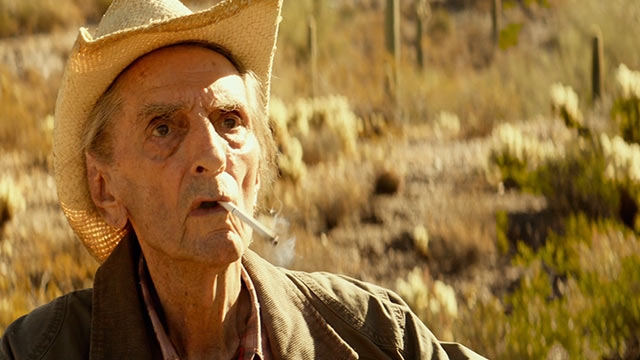Review: Lucky
Watching Lucky so soon after the incomparable Harry Dean Stanton’s passing was an odd experience. On the one hand, the film plays like a quiet highlights reel of all of Stanton’s most famous and enduring roles, especially his most lauded role: that of Travis Henderson in Wenders’ Paris, Texas. At one point, director John Carroll Lynch frames Stanton walking down a staircase lit neon red and green in a shot that very directly echoes an image near the climax of Paris, Texas. It’s a poignant moment; one that feels like the ghost of a great actor returning to his most vaunted role to inhabit its emotions one last time. On the other hand, Lucky is very much a film about death and coming to terms with one’s own mortality.
Stanton’s Lucky is a character of routine. He wakes in the morning, does his daily regimen of aerobics, goes to a local diner and sits in the same booth, goes to a local bar and sits on the same bar stool, and comes home and sleeps in the same bed each night. When a string of events upend Lucky’s quietude: his friend Howard’s (played by none other than the legendary surrealist David Lynch) pet tortoise – President Roosevelt – goes missing and a visit to the doctor after a nasty fall reveals that despite Lucky’s healthy lungs and brain he is dying, he begins to take stock of the people around him.
Where in Paris, Texas, the arid, vacant desert landscapes seemed to call attention to the themes of connection and isolation that Wenders built over the film’s two-plus hour runtime, the deserts of Lucky seem to suggest the gaping existential hole that death leaves in its wake: a point that Stanton communicates beautifully through a heartbreaking monologue (made all the more heartbreaking by its relevance in the wake of his passing) near three-quarters of the way through the film. The deserts here aren’t necessarily a symbol of solitude, but rather a reminder of the harsh realities of existence and the permanent and inevitable threat of decay. And, as Lucky learns to become an integrated part of the community he has long shunned around him, the desert becomes a quiet, peaceful acceptance of the limited time he has left.
In a post-screening Q&A John Carroll Lynch noted that Harry Dean Stanton was an extraordinary actor in many ways, but what draws us to him as an onscreen presence is Stanton’s ‘everyman-ness’. Through it Stanton somehow chips away at the obfuscating mystery surrounding the human condition and reveals how we love and connect with one another and learn to accept the inevitability of our ultimate fate. Lucky is, for much of its runtime, a culmination of a near six-decade long career of empathetic cinema.
It’s a role that lets Stanton reflect on how he has come to understand his part as an actor and as a ninety-year old human being. Here is a performance that serves as a perfect capstone to a brilliant career, even if we all wish that career could have extended beyond the sunset. Here’s to one of the greatest actors to ever grace the screen. Midway through Paris, Texas, Hunter says to Travis, “I could always feel you walking around – talking someplace”. Well, we can all feel you walking around – talking someplace today, Harry. Goodnight and see you on the other side.















